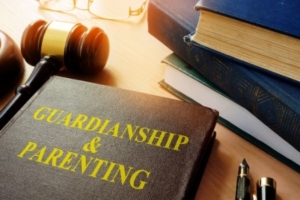
Notice: Please note that Rebeccah Beller is a Florida attorney specializing in guardianship matters in the state of Florida. Our legal team only handles guardianships within Florida and cannot provide assistance for cases outside of this jurisdiction.
What Is a Guardianship for Minors?
A guardianship is a legal process where a judge appoints a surrogate decision-maker (i.e., guardian) to make personal or financial decisions for someone else. The person needing this assistance is called the “ward.” A ward can be either an incapacitated adult or a minor. In Florida, a minor is a person under 18 years of age.
In Florida, there are certain reasons for guardianship of a minor.
Minor Receives Inheritance or Settlement
Florida law requires the appointment of a guardian to manage a minor’s property if they receive a settlement or judgment that exceeds $15,000. The guardian is responsible for managing the money to serve the minor’s best interests.
Death or Incapacity of Minor’s Parents
If a minor’s natural parents (biological or adoptive) pass away or lose their mental or physical ability to care for the child, the court may require guardianship. Incarceration is another instance where guardianship may be necessary for a minor.
Now that you know the reasons for initiating a guardianship, you may wonder, How does guardianship for minors work? We’ll walk through the process below.
Types of Guardianships for Minors
In Florida, there are different types of guardianships. Depending on the circumstances, you will petition for a guardian of the person, property, or both.
Guardian of the Person
A guardian of the person makes decisions about the minor’s physical self. This includes the minor’s living situation, social activities, and overall well-being.
Guardian of the Property
A guardian of the property handles mostly financial matters. For example, a guardian may be necessary to manage an inheritance that the minor receives.
Guardian of the Person and Property
A guardian of the person and property oversees the physical and financial well-being of the ward.
How Does a Guardianship for Minors Work?
Establishing guardianship of a minor is a multi-step process. It is common to hire a lawyer to represent you in guardianship proceedings because of all the moving parts. There is paperwork to file, information to collect, deadlines to meet, and statutes and rules to adhere to. Having an experienced guardianship attorney to guide you through the process can provide peace of mind.
File a Petition
To initiate guardianship of a minor, you must file a petition with the local probate court. This petition includes specific information about the minor and the reason why you’re seeking guardianship.
The court may appoint an attorney to represent the minor on the petition for the appointment of a guardian. The minor is not required to appear in court for the hearings unless the court specifically states that they should appear.
Part of the petitioning process involves notifying any parent who is not a petitioner or who has not consented to guardianship. If the minor does not have parents, the petitioner must give notice to any adults with whom the minor resides.
Judge’s Determination
Unlike adult guardianship, a probate judge can appoint a guardian for a minor without an evaluation process. In fact, if everyone who is required to be given notice consents to guardianship, the probate court may appoint a guardian without a hearing.
Who Can Be a Guardian in Florida?
Any Florida resident who is 18 or older may serve as a guardian. Non-residents can also be guardians if they are related to the minor by blood, marriage, or legal adoption. Trust companies, banks, and other financial institutions can serve as guardians of the ward’s property, and non-profit organizations can be appointed as guardians of the minor’s person. Convicted felons and those incapable of fulfilling their duties as guardians are prohibited from serving as guardians.
The court gives preference to those related to the minor by blood or marriage but will also consider the wishes of a minor who is 14 years of age or older.
Keep in mind that the guardian of a minor’s finances or property can be different from the guardian (or custodian) of the minor’s person.
What Authority Does a Guardian Have Over a Minor?
The guardian of a minor has the authority of a plenary guardian, meaning they have full decision-making power. Ultimately, the guardian must act in the minor’s best interests.
Guardians of the minor’s person have the duty to file an annual guardianship plan with the court. This annual plan provides information about the ward’s living situation, mental and physical health, education, and social needs.
Does a Guardian of a Minor Get Paid for Their Services?
A guardian is entitled to a “reasonable fee for services” and reimbursement for costs spent on the ward.
When Does Guardianship of a Minor End?
A guardianship of a minor terminates when the minor reaches the age of majority (i.e., 18 years of age). The guardian must file a final report and receive a discharge from the court.
The Jacksonville, FL Guardianship Lawyer at Beller Law, PL, Can Help
If you need assistance petitioning for the guardian of a minor, we can help. The guardianship lawyer at Beller Law, PL has over 25 years of experience helping families in Jacksonville, FL. We offer a wide range of legal services related to guardianships. We can do everything from preparing your paperwork to representing you in court—and we can even fulfill your legal duties as a guardian. We take the time to educate our clients throughout the process and keep them informed of what lies ahead.
Securing guardianship is not a simple legal process but one that takes time and legal knowledge. Contact our experienced guardianship lawyer by calling our office or submitting a request online.
